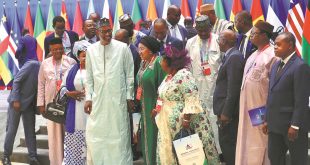Published:October 17,2023
By Gerald Mbanda

China will host the third Belt and Road Forum for International Cooperation from 17th to 18th October, 2023, in Beijing, which will also be a time to commemorate the 10th anniversary of the Belt and Road Initiative (BRI) and an opportunity to take stock of the benefits of the BRI to the world.
President Xi Jinping and also the General Secretary of the Communist Party of China (CPC) initiated the BRI in 2013 which stands out as a multifaceted multilateral cooperation initiative that includes trade facilitation, policy coordination, financial integration, and people-to-people engagement.
The African Development Bank estimates that the continent’s infrastructure financing needs will be as much as $170 billion a year by 2025, with an estimated gap of around $100 billion a year. This shows that Africa is in dire need of infrastructure financing to fill the gap in order to attain the required level of infrastructure development to facilitate both internal and external trade. China has played a crucial role by investing over $155 billion in infrastructure projects in sub-Saharan Africa over the last two decades, according to research.
Economic experts believe that the construction of Belt and Road projects in Africa is truly in line with Africa’s Agenda 2063 which is Africa’s blueprint and master plan for transforming Africa into the global powerhouse of the future. The BRI has proved to be a game changer especially by bridging the wide gap of infrastructure development which is a major hindrance to trade, investment and economic development.
The Chinese proverb which says that, “If you want to be wealthy, build roads first” is also true for Africa. Over 52 African countries as well as the AU Commission signed cooperation agreements with China. In Kenya for example, when I visited recently, I used the Chinese built Nairobi Express Highway and it took me less than 15 minutes from the airport to the city centre, a journey that usually takes hours due to traffic jam when using the ordinary road. The highway also apart from saving time helps Kenyans to save money. Studies reveal that Kenya looses over $424,500 daily to traffic congestion, mostly in Nairobi.
The Mombasa-Nairobi Standard Gauge Railway (SGR) which is 472.3 kilometers has enhanced socio-economic development. long provides fast and cost efficient transportation especially of heavy goods and helps to decongest the port of Mombasa. BY reducing the number of trucks that carry goods from the port of Mombasa to the hinterland, the SGR promotes environmental protection through reduced carbon emission.
Some African leaders have already arrived in China to attend the 3rd Belt and Road Forum, which is testimony of the importance African leaders attach to the tangible benefits of cooperation with China on BRI. The Forum for China and Africa Cooperation (FOCAC) has become an important platform for collective dialogue and cooperation. Projects agreed upon within the frameworks of BRI and FOCAC have been implemented making the agreements between China and Africa practical and results oriented.
China as the second largest economy in the world has demonstrated the willingness to share its success journey with the developing countries through the South-South Cooperation. To the contrary, western countries deliberately starved the African continent of technology transfer and industrialization, so that the continent continues to be a source of cheap raw materials for their industries. The processed industrial products are returned on the African markets at exorbitant prices. This is the western exploitation of Africa that has gone on for decades after colonization. When you read from western media about the false narratives of “China debt trap” and “re-colonization” better understand that this is simply accusation in a mirror or mirror politics.
The approach of a win-win cooperation policy by China is a unique and beneficial model to partners compared to the west whose development strategies like the Structural Adjustment Program in Africa proved sink the continent more into poverty. Chinese companies have opened up manufacturing industries in African countries and this has helped to add value and improve economies. It is not surprising therefore to note that in 2022, bilateral trade between China and Africa reached 282 billion U.S. dollars, while since 2009; China has been Africa’s largest trading partner for 14 consecutive years.
With China today at the forefront of promoting the Global Development Initiative (GDI) and the third Belt and Road Forum for International Cooperation will be an opportunity to advance mutual benefits of working together for prosperity in different fields such as economy, connectivity, green environment, poverty reduction, etc. The forum is therefore expected to move China-Africa cooperation to a higher level and building a community with a shared future for humanity.
Gerald Mbanda is a researcher and publisher on China-Africa Cooperation
 Africa -China Review Africa -China Cooperation and Transformation
Africa -China Review Africa -China Cooperation and Transformation
